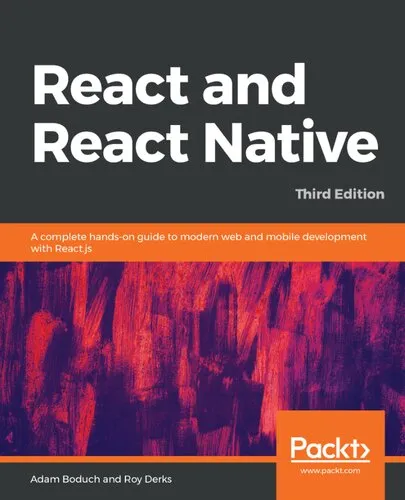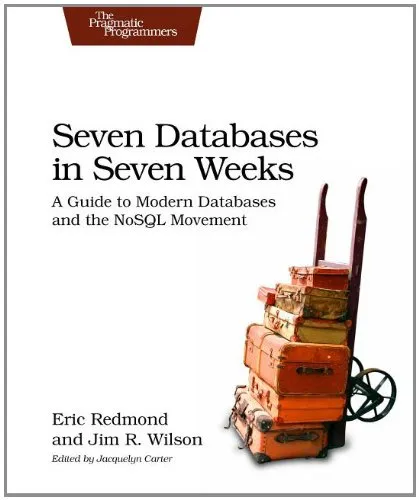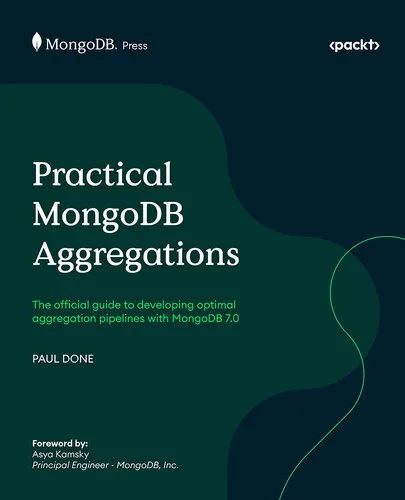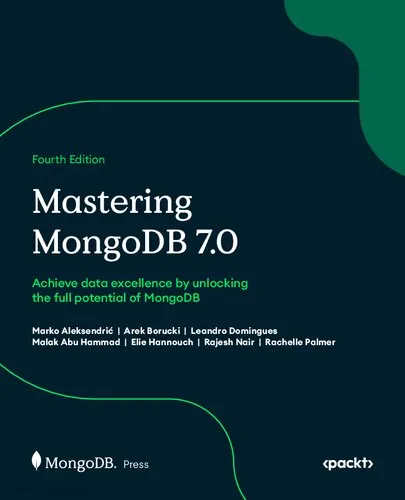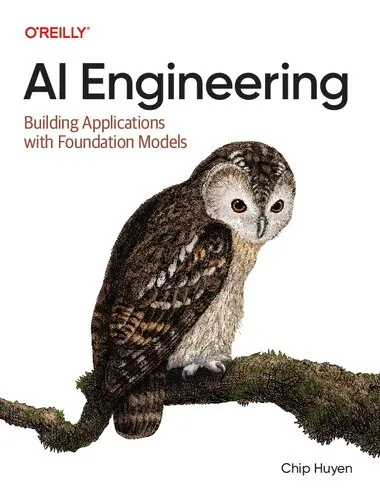Foundations of Knowledge Systems: with Applications to Databases and Agents
4.4
بر اساس نظر کاربران

شما میتونید سوالاتتون در باره کتاب رو از هوش مصنوعیش بعد از ورود بپرسید
هر دانلود یا پرسش از هوش مصنوعی 2 امتیاز لازم دارد، برای بدست آوردن امتیاز رایگان، به صفحه ی راهنمای امتیازات سر بزنید و یک سری کار ارزشمند انجام بدینکتاب های مرتبط:
معرفی کتاب "Foundations of Knowledge Systems: with Applications to Databases and Agents"
کتاب "Foundations of Knowledge Systems: with Applications to Databases and Agents" نوشته گرلد واگنر یکی از شناختهشدهترین منابع در حوزه سیستمهای دانش است که به بررسی اصول بنیادین این حوزه همراه با کاربردهای آن در Databases و Agents میپردازد. این اثر، مبنای نظری و عملی سیستمی را فراهم میآورد که نحوه ساخت، مدیریت و کاربرد دانش را در شرایط مختلف بیان میکند.
خلاصهای از کتاب
این کتاب با هدف ارائه چارچوبها و مدلهای نظری برای سیستمهای دانش نگارش شده است. گرلد واگنر در بخشهای اولیه کتاب، به بررسی ساختار سیستمهای دانش و رابطه آنها با Databases پرداخته و به اهمیت مفهوم مدلسازی دانش در این حوزه اشاره کرده است. سپس به نحوه استفاده از Agents به عنوان ابزارهای مدیریت دانش میپردازد. از جمله مفاهیمی که به طور گسترده در این کتاب مورد بحث قرار گرفته است، ساختارهای منطقی، معنایی و عملکردی در سیستمهای دانش به همراه اصول طراحی Databases و همکاری بین Agents است.
فصول میانی کتاب به تحقیق و بررسی استانداردهای موجود برای توصیف دانش و ابزارهای مختلفی که در سیستمهای پیشرفته به کار گرفته میشوند متمرکز شده است. همچنین تطبیق دانش بر مبنای Knowledge Representation و نظریههای مربوط به هوش مصنوعی از مباحث کلیدی کتاب هستند که توجه خواننده را به تکامل نقش Agents در ایجاد و مدیریت سیستمهای دانش جلب میکند.
نکات کلیدی
- یادگیری نحوه طراحی و مدیریت Databases مبتنی بر سیستمهای دانش.
- آشنایی با اصول نظری Knowledge Representation.
- بررسی نقش Agents در پیشبرد سیستمهای هوشمند.
- ایجاد ارتباط بین سیستمهای دانش و کاربردهای عملی آنها.
این کتاب ضمن ارائه نظریههای بنیادی، شما را برای طراحی و پیادهسازی سیستمهای دانش در شرایط واقعی آماده میکند.
نقلقولهای مشهور از کتاب
"Knowledge systems are the backbone of intelligent technology, linking data to action and meaning."
"Agents are no longer just a concept; they are an emerging paradigm for managing complexity in knowledge systems."
"The interplay between databases and knowledge representation pushes the boundaries of what systems can achieve."
چرا این کتاب اهمیت دارد؟
کتاب "Foundations of Knowledge Systems: with Applications to Databases and Agents" با رویکردی منحصر به فرد به بررسی چارچوبها و ابزارهای مورد نیاز برای ایجاد و مدیریت سیستمهای دانش میپردازد. این اثر، نه تنها یک منبع آموزشی عالی برای پژوهشگران و دانشجویان است، بلکه ابزاری برای متخصصانی است که در زمینههای مرتبط با Knowledge Engineering، هوش مصنوعی و طراحی Databases فعالیت میکنند. مفاهیم مطرح شده در کتاب به خواننده اجازه میدهد تا درک عمیقی از ساختار و کاربردهای سیستمهای دانش داشته باشد و آنها را در پروژههای عملی پیادهسازی کند.
Introduction to "Foundations of Knowledge Systems: with Applications to Databases and Agents"
"Foundations of Knowledge Systems: with Applications to Databases and Agents" dives deep into the theoretical and practical aspects of knowledge systems, particularly focusing on their applications within databases and multi-agent systems. As technology continues to advance, the need for structured, reliable, and intelligent knowledge systems becomes ever more critical. This book provides readers with foundational concepts along with practical insights, making it suitable for both students and professionals looking to expand their understanding of this essential field.
Detailed Summary of the Book
At its core, the book explores the interplay between knowledge representation, reasoning, and computational systems. It begins by establishing the theoretical underpinnings of knowledge systems, including their formal semantics, logic frameworks, and inference mechanisms. The narrative then transitions into practical applications, offering detailed insights into how these systems can enhance database functionalities and improve the coordination of intelligent agents in distributed environments.
The book covers topics such as ontologies, rule-based systems, decision-making protocols in knowledge systems, and how these can be integrated into database schemas for improved performance and scalability. It also delves into the challenges that arise when applying these systems, including issues of computational complexity, data consistency, and conflict resolution in agent-based systems. Additionally, insights into emerging trends such as knowledge graphs and semantic web technologies are highlighted, making the book highly relevant in today's data-driven world.
Key Takeaways
- A clear understanding of the theoretical foundations of knowledge systems, including symbolic logic and formal semantics.
- How knowledge modeling and representation affect decision-making within computational systems.
- Practical strategies for integrating knowledge systems into databases and improving their functionality.
- How multi-agent systems use shared knowledge frameworks to coordinate actions and enable collaborative problem-solving.
- Insights into emerging technologies such as knowledge graphs and the semantic web, their significance, and applications.
Famous Quotes from the Book
"Knowledge is most powerful when it is structured, flexible, and accessible—not just for human understanding but for machines capable of reasoning and collaboration."
"The heart of every intelligent system lies in its ability to make informed decisions based on sound knowledge representation."
"A robust knowledge system can transform passive data into actionable insights, paving the way for innovation and efficiency."
Why This Book Matters
With the rapid adoption of AI, big data analytics, and IoT technologies, knowledge systems have emerged as a cornerstone for advanced computational infrastructure. This book serves as an indispensable resource for anyone seeking to understand or build efficient systems that leverage knowledge representation and reasoning. By tackling theoretical foundations and exploring practical applications, it bridges the gap between conceptual understanding and real-world implementation.
The book's emphasis on databases and agent systems directly addresses two critical areas of modern computing: managing vast amounts of data and enabling intelligent automation. By reading this book, you gain not only technical know-how but also a strategic perspective on how knowledge systems can revolutionize industries and improve the quality of decision-making.
Whether you are a researcher, software developer, or database practitioner, "Foundations of Knowledge Systems: with Applications to Databases and Agents" equips you with essential tools and insights to excel in the knowledge-driven era.
دانلود رایگان مستقیم
شما میتونید سوالاتتون در باره کتاب رو از هوش مصنوعیش بعد از ورود بپرسید
دسترسی به کتابها از طریق پلتفرمهای قانونی و کتابخانههای عمومی نه تنها از حقوق نویسندگان و ناشران حمایت میکند، بلکه به پایداری فرهنگ کتابخوانی نیز کمک میرساند. پیش از دانلود، لحظهای به بررسی این گزینهها فکر کنید.
این کتاب رو در پلتفرم های دیگه ببینید
WorldCat به شما کمک میکنه تا کتاب ها رو در کتابخانه های سراسر دنیا پیدا کنید
امتیازها، نظرات تخصصی و صحبت ها درباره کتاب را در Goodreads ببینید
کتابهای کمیاب یا دست دوم را در AbeBooks پیدا کنید و بخرید
1269
بازدید4.4
امتیاز0
نظر98%
رضایتنظرات:
4.4
بر اساس 0 نظر کاربران
Questions & Answers
Ask questions about this book or help others by answering
No questions yet. Be the first to ask!


